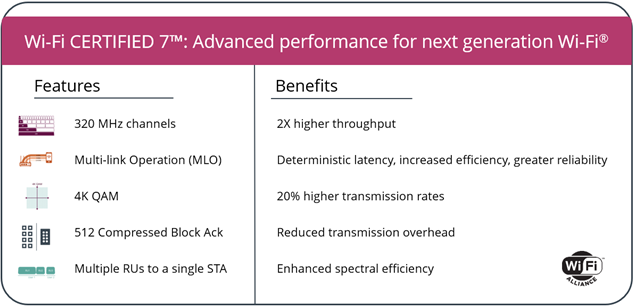Brother
Professional
- Messages
- 2,590
- Reaction score
- 533
- Points
- 113
What are the benefits of the new wireless standard?
The Wi-Fi Alliance has officially released the final version of the technical specification for the next-generation Wi-Fi 7 (Wi-Fi CERTIFIED 7TM) wireless standard. The new standard introduces advanced features that should improve Wi-Fi performance and connectivity in different environments. There are already devices on the market that support it, but now manufacturers will need to follow a number of rules to meet the requirements of the standard.

Key innovations of Wi-Fi 7:
It is noted that Wi-Fi 7 will be backward compatible with older devices. Devices with support for previous versions of the standard themselves will not directly benefit from Wi-Fi 7, but the benefits will be noticeable as new gadgets are released on the market. According to forecasts, more than 233 million devices with Wi-Fi 7 support may enter the market in 2024, and by 2028 this number will increase to 2.1 billion.
Intel, Qualcomm and MediaTek are involved in the development of chips with Wi-Fi 7 support.
The Wi-Fi Alliance has officially released the final version of the technical specification for the next-generation Wi-Fi 7 (Wi-Fi CERTIFIED 7TM) wireless standard. The new standard introduces advanced features that should improve Wi-Fi performance and connectivity in different environments. There are already devices on the market that support it, but now manufacturers will need to follow a number of rules to meet the requirements of the standard.

Key innovations of Wi-Fi 7:
- Support for 320 MHz channels in countries where the 6 GHz band is allowed for Wi-Fi;
- Multi-Link Operation (MLO) technology for simultaneous data transmission over multiple channels. It reduces latency and improves connection reliability;
- Quadrature Amplitude Modulation (QAM) 4K, providing a 20% increase in transmission speed compared to 1024 QAM;
- Implemented support for 512 Compressed block-acks to improve efficiency and reduce losses;
- Multi-RU technology that provides flexibility when planning band resources, which increases its efficiency.
It is noted that Wi-Fi 7 will be backward compatible with older devices. Devices with support for previous versions of the standard themselves will not directly benefit from Wi-Fi 7, but the benefits will be noticeable as new gadgets are released on the market. According to forecasts, more than 233 million devices with Wi-Fi 7 support may enter the market in 2024, and by 2028 this number will increase to 2.1 billion.
Intel, Qualcomm and MediaTek are involved in the development of chips with Wi-Fi 7 support.

